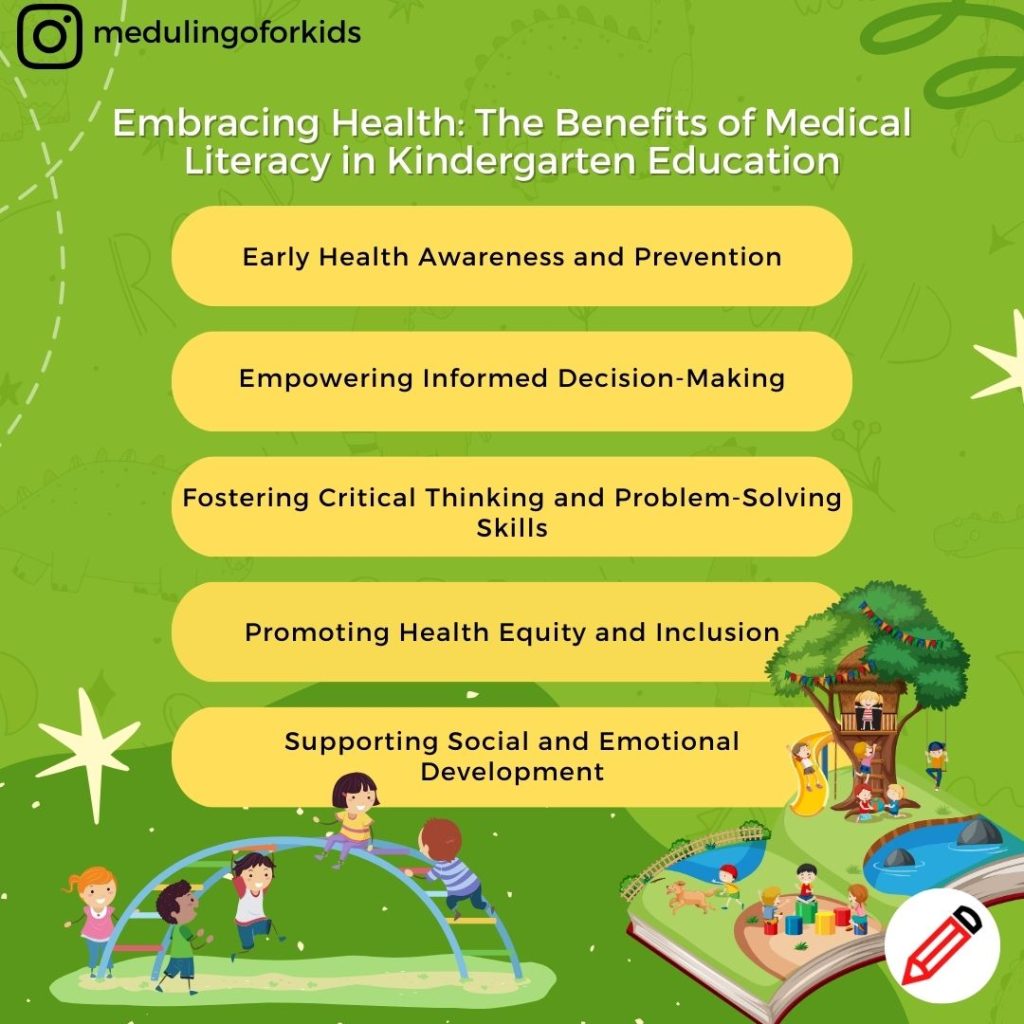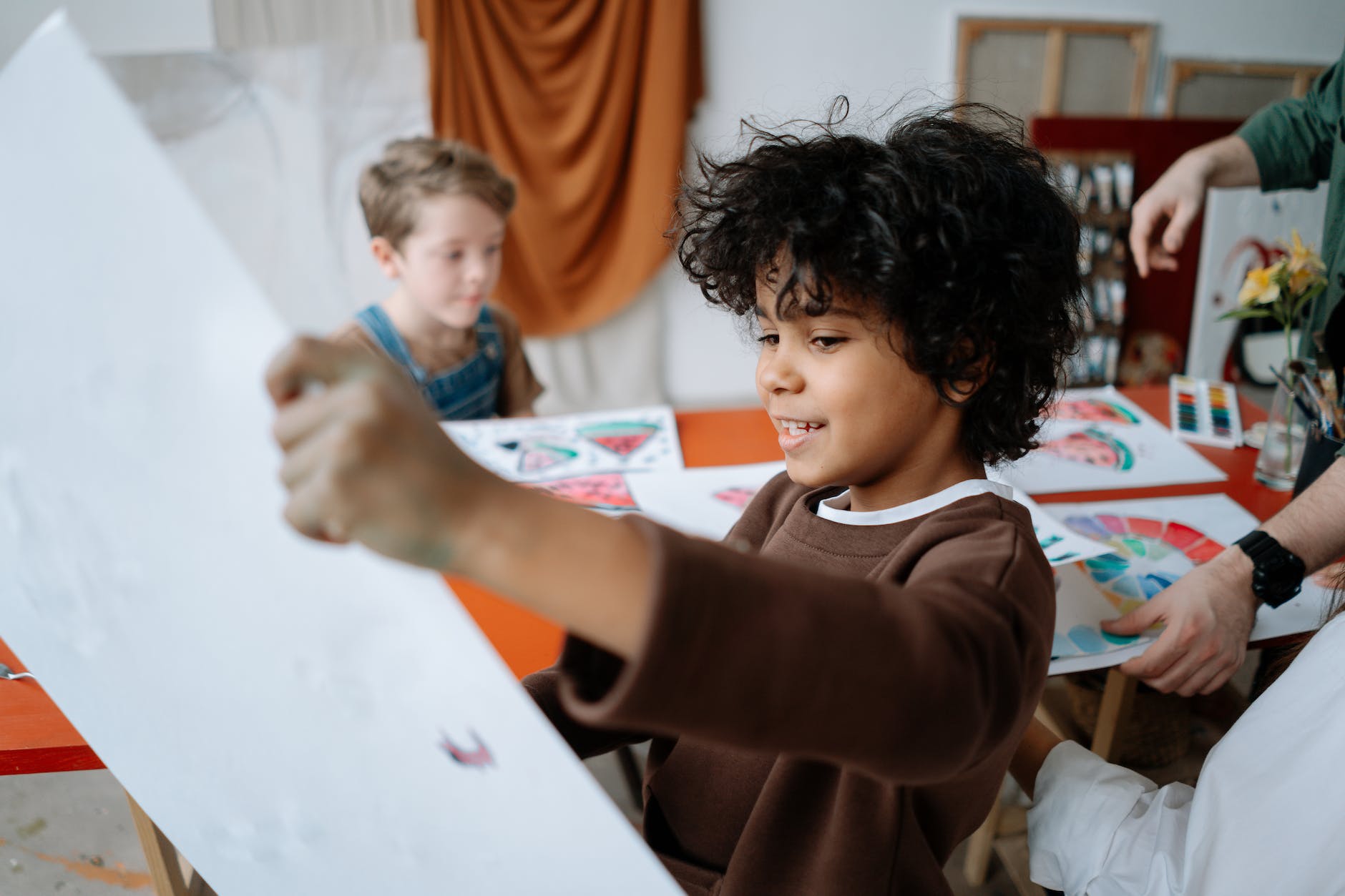In early childhood education, the integration of medical literacy into kindergarten curriculum emerges as a transformative approach to nurturing holistic development and promoting lifelong wellness in young learners. Medical literacy encompasses the knowledge, skills, and attitudes necessary for individuals to understand and navigate health-related information, make informed decisions, and advocate for their own well-being. By introducing medical literacy from kindergarten and embracing health, educators lay the foundation for a lifetime of health awareness, preventive care, and empowered decision-making.

Here are the compelling benefits of including medical literacy in kindergarten as part of a holistic education:
1. Early Health Awareness and Prevention:
Kindergarten serves as a pivotal stage in a child’s development, offering a prime opportunity to instill healthy habits and preventive care practices from an early age. By integrating medical literacy into kindergarten curriculum, educators empower children to recognize signs of illness, understand basic health concepts, and adopt healthy behaviors. Through engaging activities, discussions, and resources tailored to their developmental level, children learn about topics such as nutrition, hygiene, safety, and physical activity. By fostering early health awareness and prevention strategies, medical literacy in kindergarten sets the stage for a lifetime of well-being and disease prevention.
2. Empowering Informed Decision-Making:
Medical literacy equips children with the knowledge and skills to make informed decisions about their health and well-being. From understanding common illnesses and symptoms to learning how to communicate their health needs effectively, children develop a sense of agency and empowerment over their own health care. By introducing age-appropriate health information and resources, educators create a supportive environment where children feel confident in seeking help when needed and advocating for their health needs. Empowering informed decision-making from kindergarten instills valuable life skills that children can carry with them into adulthood.
3. Fostering Critical Thinking and Problem-Solving Skills:
Engaging with medical literacy encourages critical thinking and problem-solving skills essential for navigating health-related challenges. Through inquiry-based learning approaches, children learn to evaluate health information, analyze risks and benefits, and apply evidence-based strategies to promote their health and well-being. By exploring topics such as disease prevention, safety practices, and healthy lifestyle choices, children develop a deeper understanding of the factors that influence health outcomes and learn to make informed decisions in various contexts. Fostering critical thinking and problem-solving skills from kindergarten prepares children to navigate complex health-related decisions throughout their lives.
4. Promoting Health Equity and Inclusion:
Incorporating medical literacy in kindergarten promotes health equity and inclusion by ensuring that all children have access to medical language and resources. By addressing diverse health needs and experiences, educators create a culture of inclusion where every child’s health and well-being are valued and supported. Medical literacy instruction promotes understanding and empathy towards individuals with different health conditions, fostering a sense of community and mutual support among students. By promoting health equity and inclusion from kindergarten, educators lay the foundation for a healthier and more equitable society.
5. Supporting Social and Emotional Development:
Medical literacy instruction in kindergarten supports social and emotional development by promoting empathy, resilience, and self-awareness. Through discussions about health-related experiences, children learn to recognize and express their emotions, develop coping strategies, and cultivate empathy towards others. By creating a safe and supportive environment for discussing health-related topics, educators help children build positive relationships, develop communication skills, and foster a sense of belonging within their classroom community. Medical literacy instruction encourages children to develop healthy attitudes towards themselves and others, laying the groundwork for positive social and emotional development.
Start Embracing Health with Medical Literacy in Kindergarten
In conclusion, the inclusion of medical literacy in kindergarten curriculum is essential for fostering holistic development, empowering children to make informed decisions about their health and well-being, and promoting a culture of wellness and inclusion. By introducing medical literacy from an early age, educators empower children to prioritize their health and well-being, advocate for their needs, and contribute to a healthier and more equitable society. As we embrace the transformative power of medical literacy, let us nurture a generation of children who are empowered to take charge of their health, make informed decisions, and lead fulfilling lives.
===
Interested in teaching medical literacy pain free? Shop medical literacy resources!

This article was drafted by ChatGPT and edited by Joan Lee Tu, the founder of MedULingo.com.
You may also be interested in the following articles:
Medical Literacy from Kindergarten: Builds a Foundation for Lifelong Learning
Planting Seeds: The Case for Starting Medical Literacy in Kindergarten
Cultivating Allergy Awareness from Kindergarten with Medical Literacy
Planting Seeds: The Case for Developing Medical Literacy on Allergies in Kindergarten
The Benefits of Developing Medical Literacy About Dermatitis from Kindergarten
Planting Seeds: The Case for Medical Literacy on Dermatitis from Kindergarten
Cultivating Lifelong Learning in Medical Literacy: From Kindergarten to Old Age
Fostering Wellness: The Importance of Medical Literacy in Kindergarten Education
Embracing Health: The Benefits of Medical Literacy in Kindergarten Education

